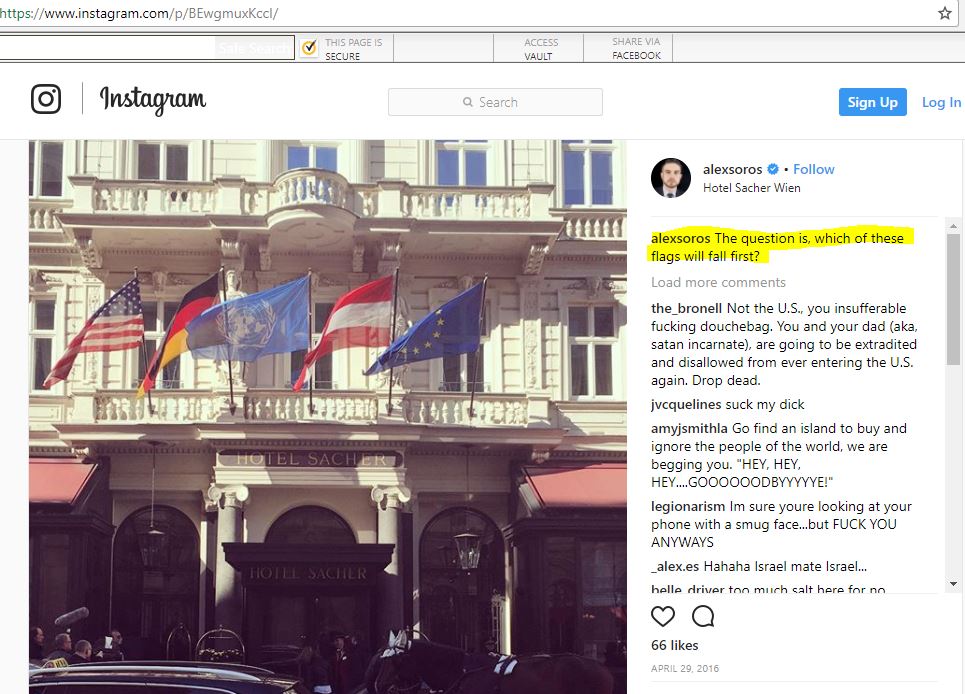It looks like you're using an Ad Blocker.
Please white-list or disable AboveTopSecret.com in your ad-blocking tool.
Thank you.
Some features of ATS will be disabled while you continue to use an ad-blocker.
share:
originally posted by: Greenanon
a reply to: dashen
The 11th commandment should have been take your own advice.
Most people don't know about the Twelfth commandment...
Exodus 20:17 7/8 "Thou shalt offer CoramDeo a slice of Apple Pie, for this is good in the eyes of the Lord."
[from the Director's Cut]
So if Netanyahu is a Rothschild?
And Hitler was a Rothschild?
Does that mean we should thank Hitler for creating a new Jewish state?
No
And Hitler was a Rothschild?
Does that mean we should thank Hitler for creating a new Jewish state?
No

Yesterday was my 1st time posting here in my 13yrs lurking. After posting the photo of the "order of Golden Fleece" things went a little ham for some here as well me. My internet was down for the day(never happened like that.) I found it odd to find so little information on this piece until I did a little more digging. Back to my idea of the family crests above the sacrificed sheep. In this photo the numbers go from 1-52(ruling families?)
The Wikipedia info is bland as is the photo which does not detail family crests
Here is the location and image with the (1-52)
Translation of page:
Crowns and jewels of the Habsburgs
Imperial Treasury Vienna
When was the last time you were in the imperial treasury? We would like to encourage you once again, because in addition to architecture and painting – Think of churches, castles or courtly portraits – crowns, scepter and garments are the most noble relics of passed Dominion Systems. As such, the Holy Roman Empire (which at times also included the addition of "German Nation") and the Empire of Austria are the central focus of the imperial treasury.
Marvel at the treasure of the Order of the Golden Fleece, hold the 15th century Burgundy treasure and the throne-cradle bed of Napoleon's son. Also to be seen are enchanting pieces of jewellery Habsburg emperors and princesses.
Interesting blog about Inbreeding of Habsburg.
edit on 16-3-2018 by LurkNoMore because: Left out image
Probably just a random event, but
Rep. Louise Slaughter (D-NY) just
died. She was 88, and according to the article was hospitalized with a concussion earlier this week. (That means she likely suffered a fall.)
Her district is Rochester, NY.
Hmm.Infinity is currently getting invaded by fake Q's and Flat Earthers. Always a good indication that something major drops today.
I'm hoping for this:
originally posted by: Perfectenemy
Hmm.Infinity is currently getting invaded by fake Q's and Flat Earthers. Always a good indication that something major drops today.
It's official: McCabe has been fired.
I mentioned it a while ago. And I may even make a thread about it one of these days. But we should eventually talk about the Hessians, the Hessian
Army, the kingdom of Hesse and the landgraves of Hess Cassell and how they literally gave the Rothschilds their start on their path to taking over the
world.
I heard the story from an actual Rothschild. Not the baby eating branch of the family.
I heard the story from an actual Rothschild. Not the baby eating branch of the family.
Another retirement: Jeff Kirwan, CEO of clothing store The GAP.
Article per USA Today.
Granted, it's been years since that store had any relevance, but it's still another entry on the list.
Article per USA Today.
Granted, it's been years since that store had any relevance, but it's still another entry on the list.
Relevant to MCCabe's firing and retention of benefits:
Q & A Session: Crime Conviction Effect on Retirement Pension
Those offense are:
5 U.S. Code § 8312 - Conviction of certain offenses
Now, as to which, if any, of the above referenced statutes McCabe might be charged under, I do not know. Perhaps a member more knowledgeable could weigh in?
Q:
If someone has retired from federal service and they are convicted of a crime, will they lose their pension? Do they have to inform the Office of Personnel Management of the fact that they were convicted of a crime.
A:
If you are no longer federally employed or maintaining a security clearance, you are generally not obligated to inform OPM of a post-retirement conviction. Being convicted of a crime almost never jeopardizes a federal pension – the rare exception to this rule for federal civil servants is the list of crimes codified at 5 U.S.C § 8312. Those charges almost all relate to criminal disloyalty to the United States: espionage, treason, sabotage, insurrection against the United States, improper sharing or intentional loss of certain highly classified documents, and so on. There are occasional efforts by some Members of Congress to expand the sorts of convictions which could cause a retiree to lose their federal pension, although none of those proposals have been passed to date.
As it could impact some readers, I would also like to note that members of the military who are convicted in a court martial under the Uniform Code of Military Justice can lose their governmental pensions for a much wider array of crimes, including those which do not necessarily reflect crimes against the security of the United States
Q & A Session: Crime Conviction Effect on Retirement Pension
Those offense are:
(b) The following are the offenses to which subsection (a) of this section applies if the individual was convicted before, on, or after September 1, 1954:
(1) An offense within the purview of—
(A) section 792 (harboring or concealing persons), 793 (gathering, transmitting, or losing defense information), 794 (gathering or delivering defense information to aid foreign government), or 798 (disclosure of classified information), of chapter 37 (relating to espionage and censorship) of title 18;
(B) chapter 105 (relating to sabotage) of title 18;
(C) section 2381 (treason), 2382 (misprision of treason), 2383 (rebellion or insurrection), 2384 (seditious conspiracy), 2385 (advocating overthrow of government), 2387 (activities affecting armed forces generally), 2388 (activities affecting armed forces during war), 2389 (recruiting for service against United States), or 2390 (enlistment to serve against United States), of chapter 115 (relating to treason, sedition, and subversive activities) of title 18;
(D) section 10(b)(2), (3), or (4) of the Atomic Energy Act of 1946 (60 Stat. 766, 767), as in effect before August 30, 1954;
(E) section 16(a) or (b) of the Atomic Energy Act of 1946 (60 Stat. 773), as in effect before August 30, 1954, insofar as the offense is committed with intent to injure the United States or with intent to secure an advantage to a foreign nation; or
(F) an earlier statute on which a statute named by subparagraph (A), (B), or (C) of this paragraph (1) is based.
(2) An offense within the purview of—
(A) article 104 (aiding the enemy), article 106 (spies), or article 106a (espionage) of the Uniform Code of Military Justice (chapter 47 of title 10) or an earlier article on which article 104 or article 106, as the case may be, is based; or
(B) a current article of the Uniform Code of Military Justice (or an earlier article on which the current article is based) not named by subparagraph (A) of this paragraph (2) on the basis of charges and specifications describing a violation of a statute named by paragraph (1), (3), or (4) of this subsection, if the executed sentence includes death, dishonorable discharge, or dismissal from the service, or if the defendant dies before execution of that sentence as finally approved.
(3) Perjury committed under the statutes of the United States or the District of Columbia—
(A) in falsely denying the commission of an act which constitutes an offense within the purview of—
(i) a statute named by paragraph (1) of this subsection; or
(ii) an article or statute named by paragraph (2) of this subsection insofar as the offense is within the purview of an article or statute named by paragraph (1) or (2) (A) of this subsection;
(B) in falsely testifying before a Federal grand jury, court of the United States, or court-martial with respect to his service as an employee in connection with a matter involving or relating to an interference with or endangerment of, or involving or relating to a plan or attempt to interfere with or endanger, the national security or defense of the United States; or
(C) in falsely testifying before a congressional committee in connection with a matter under inquiry before the congressional committee involving or relating to an interference with or endangerment of, or involving or relating to a plan or attempt to interfere with or endanger, the national security or defense of the United States.
(4) Subornation of perjury committed in connection with the false denial or false testimony of another individual as specified by paragraph (3) of this subsection.
(c) The following are the offenses to which subsection (a) of this section applies if the individual was convicted before, on, or after September 26, 1961:
(1) An offense within the purview of—
(A) section 2272 (violation of specific sections) or 2273 (violation of sections generally of chapter 23 of title 42) of title 42 insofar as the offense is committed with intent to injure the United States or with intent to secure an advantage to a foreign nation;
(B) section 2274 (communication of restricted data), 2275 (receipt of restricted data), or 2276 (tampering with restricted data) of title 42; or
(C) section 783 (conspiracy and communication or receipt of classified information) of title 50 or section 601 of the National Security Act of 1947 (50 U.S.C. 421)
5 U.S. Code § 8312 - Conviction of certain offenses
Now, as to which, if any, of the above referenced statutes McCabe might be charged under, I do not know. Perhaps a member more knowledgeable could weigh in?
a reply to: Perfectenemy
Isn’t there amateur rocket video somewhere definitively proving the Earth is both massive and round? Defs saw that on the Science Channel.
Isn’t there amateur rocket video somewhere definitively proving the Earth is both massive and round? Defs saw that on the Science Channel.
Strzok and Flynn’s Judge were friends?
That’s grounds for a misstrial. Strzok was a rogue asset with an agenda.
That’s grounds for a misstrial. Strzok was a rogue asset with an agenda.
originally posted by: crankyoldman
Can you imagine what it takes to stand up to the negative energy this man/being has tolerated?
It was the irrational foaming-at-the-mouth vitriol against Trump that first led me to suspect he is a good guy.
Re: posts on BHO being homosexual
I've been re-reading old posts...
Q Post #7
My eye caught the bold words in post (my emphases)...
The British equivalent of "Fag" is "Poof"!
Has Q been telling us since almost day 1 that Hussein is homosexual?
I've been re-reading old posts...
Q Post #7
Oct 29 2017 21:58:37 (EDT) Anonymous ID: Eka5Om1K 147167304→
Why wasn’t HRC prosecuted for the emails? Put simply, Obama ultimately OK’d by using the non govt email addy to communicate w/ Clinton. Obama also had an alias along with each of his cabinet members. Therefore indicting HRC would lead to indicting Obama & his cabinet etc which could never happen. Remember he lied about knowing but that ultimately came out in the dump. Poof!
My eye caught the bold words in post (my emphases)...
The British equivalent of "Fag" is "Poof"!
Has Q been telling us since almost day 1 that Hussein is homosexual?
a reply to: RelSciHistItSufi
BHO being gay is the worst kept secret in the World.
Joan Rivers mouth eventually caught up with her.
BHO being gay is the worst kept secret in the World.
Joan Rivers mouth eventually caught up with her.
a reply to: jadedANDcynical
Let McCabe keep 1/2 his pension. He'll need it for the pricy defense lawyer, after the S.C. indicts him.
Let McCabe keep 1/2 his pension. He'll need it for the pricy defense lawyer, after the S.C. indicts him.
new topics
-
The mysterious death of Aileen Conway
General Chit Chat: 2 hours ago -
Half-Life 2 is 20 Years Old - its Also Free on Steam until the 18th
Video Games: 6 hours ago -
Does the Trump win mean No More Taylor Swift??
Politicians & People: 10 hours ago
top topics
-
Don't cry do Cryo instead
General Chit Chat: 17 hours ago, 12 flags -
Does the Trump win mean No More Taylor Swift??
Politicians & People: 10 hours ago, 12 flags -
Trump-appointed judge blocks Biden administration overtime rule
Social Issues and Civil Unrest: 12 hours ago, 8 flags -
The mysterious death of Aileen Conway
General Chit Chat: 2 hours ago, 5 flags -
Half-Life 2 is 20 Years Old - its Also Free on Steam until the 18th
Video Games: 6 hours ago, 1 flags
active topics
-
-@TH3WH17ERABB17- -Q- ---TIME TO SHOW THE WORLD--- -Part- --44--
Dissecting Disinformation • 3281 • : RelSciHistItSufi -
The mysterious death of Aileen Conway
General Chit Chat • 5 • : Flyingclaydisk -
Thanksgiving 2024
Member Art • 21 • : BingoMcGoof -
Does the Trump win mean No More Taylor Swift??
Politicians & People • 48 • : TzarChasm -
President-elect TRUMP Picks MATT GAETZ for his ATTORNEY GENERAL - High Level PANIC Ensues.
2024 Elections • 86 • : RickinVa -
President-Elect DONALD TRUMP's 2nd-Term Administration Takes Shape.
Political Ideology • 210 • : WeMustCare -
How can you defend yourself when the police will not tell you what you did?
Posse Comitatus • 90 • : WeMustCare -
Russia Ukraine Update Thread - part 3
World War Three • 6813 • : Freeborn -
WATCH LIVE: US Congress hearing on UFOs, unidentified anomalous phenomena
Aliens and UFOs • 100 • : DaydreamerX -
Tariffs all around, Except for ...
Dreams & Predictions • 29 • : KnowItAllKnowNothin



